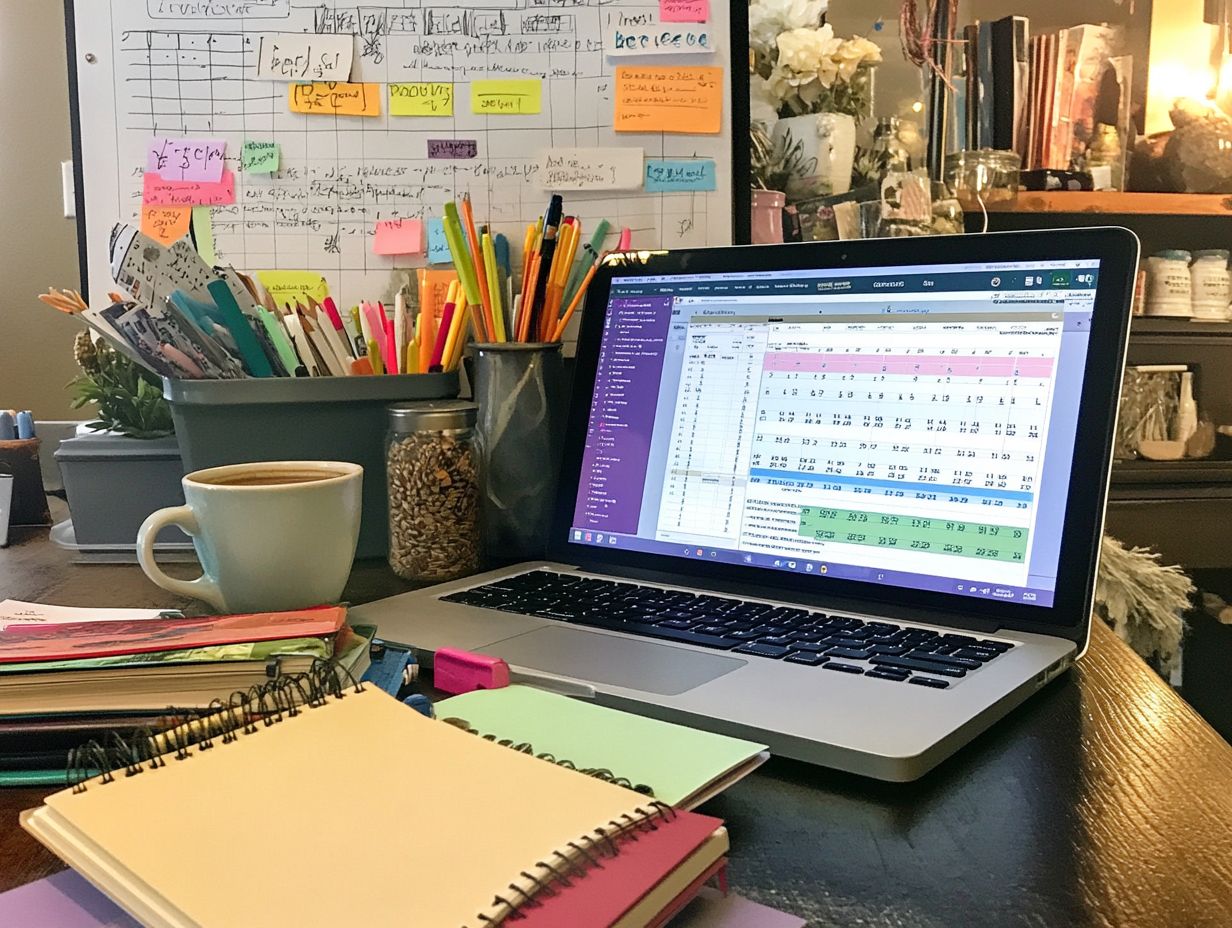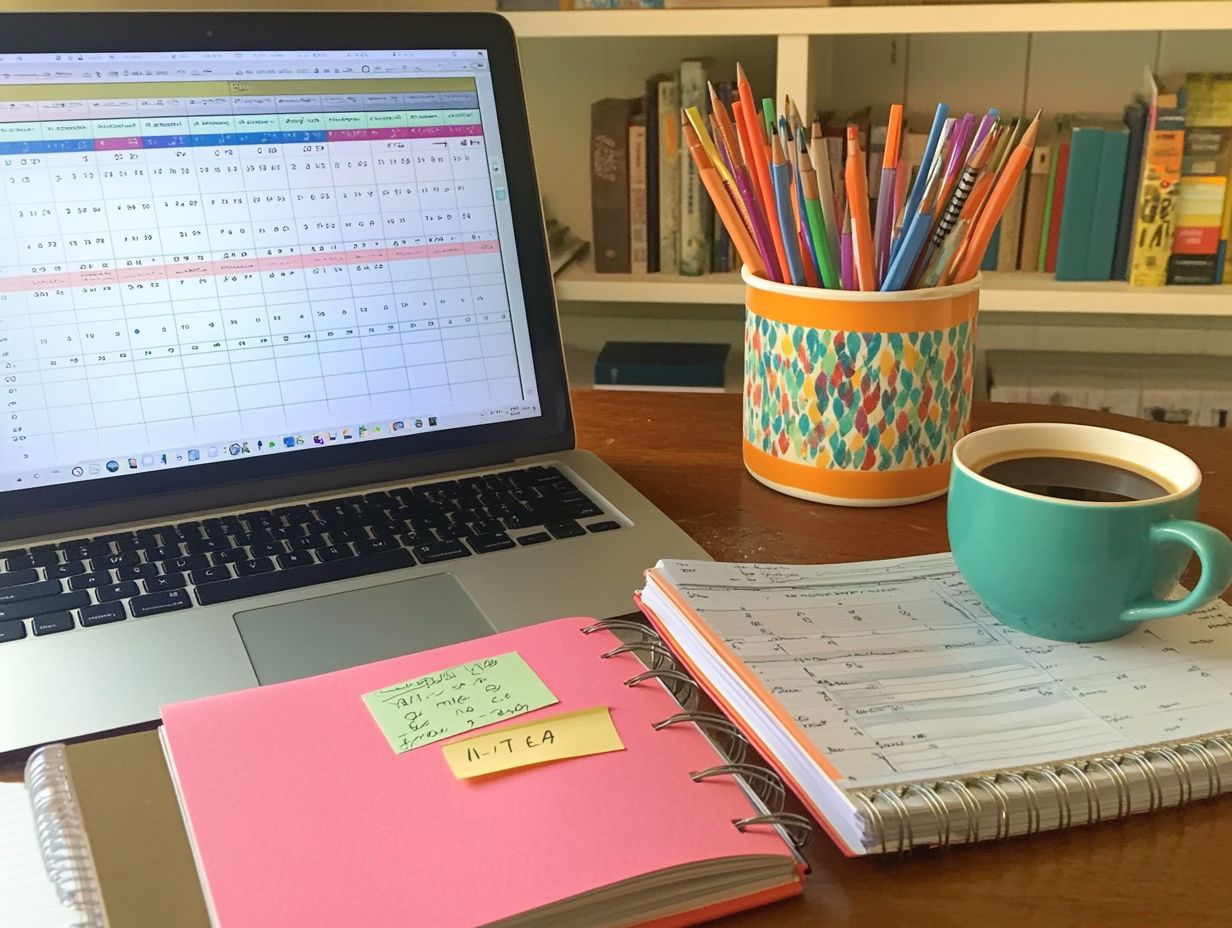In today’s rapidly evolving landscape, personal growth has become increasingly vital in both career development and lifelong learning. Developing a personalized curriculum through creative curriculum design that aligns with individual interests, professional goals, and objectives can significantly enhance the learning experience and educational journey, enabling one to identify strengths and weaknesses while establishing meaningful goals. This guide delineates the fundamental steps for constructing a customized curriculum and comprehensive plan—from assessing current knowledge and skills and selecting pertinent subjects to organizing a study plan and personal learning plan, utilizing valuable resources and online resources, and monitoring progress along your learning path. Seize the opportunity to invest in personal development and professional development and unlock your full potential.
Key Takeaways:
Why a Personal Curriculum is Beneficial

Developing a personal curriculum can greatly enhance one’s educational journey by enabling individuals to customize their learning plans using instructional design according to their unique interests, needs, and professional objectives.
This level of customization promotes a commitment to lifelong learning, supporting personal growth, career growth, while ensuring the achievement of specific milestones in both academic and career development. Recent research from Education Week explores how personalized learning strategies can effectively support these outcomes.
A well-structured personal learning plan fosters accountability through mentorship, aiding individuals in staying focused as they pursue various skills and areas of knowledge.
By effectively integrating available resources and online courses and educational materials, one can establish a systematic learning pathway that aligns with their goals and aspirations.
Understanding the Importance of Personal Growth
Personal growth is vital for achieving professional goals while simultaneously enhancing overall well-being through lifelong learning and hands-on learning and skill development.
By embracing the principle of lifelong learning, individuals can continuously evolve and adapt to the ever-changing demands of their careers. Establishing specific, measurable, achievable, relevant, and time-bound (SMART) goals, a key in curriculum design through goal setting can facilitate this process, providing clear direction and motivation. For a more detailed understanding, Asana offers a comprehensive discussion on SMART Goals, including examples and templates, showcasing their practical applications in professional settings.
For example, developing critical thinking, communication, and leadership skills through tailored educational opportunities can have a significant impact on professional trajectories. Participation in workshops, online courses, or mentorship programs like CS50 or FreeCodeCamp often yields valuable insights and fosters resilience, ultimately leading to increased career satisfaction and personal fulfillment.
Assessing Your Current Knowledge and Skills
Evaluating one’s current knowledge and skills is a crucial step in instructional planning in formulating an effective personal learning plan. This assessment offers valuable insights into individual strengths and weaknesses, including learning style, thereby facilitating the establishment of realistic learning objectives and outcomes. According to Indeed, using self-assessment tools can further enhance one’s understanding of these personal traits, helping to tailor learning plans more effectively.
Identifying Your Strengths and Weaknesses

Identifying one’s strengths and weaknesses is essential in the learning process, as it directs individuals toward targeted skill development and problem-solving skills and personalized learning activities.
Engaging in self-assessment allows individuals to clarify both areas of proficiency and those requiring improvement. Reflective practices, such as journaling and visual chart creation or seeking feedback from peers, can further enhance this understanding, providing deeper insights into learning habits and preferences.
This clarity regarding personal capabilities and challenges not only facilitates a more tailored educational journey but also cultivates an environment where learning becomes more effective and fulfilling. Ultimately, this knowledge serves as a foundational blueprint for designing a personal learning plan that aligns with individual goals and aspirations.
Setting Goals for Your Personal Curriculum
Establishing specific goals for your personal curriculum is a fundamental aspect of ensuring that your learning journey is both structured and effective.
This approach provides clear learning objectives and delineates smaller goals that facilitate the achievement of milestones throughout the process.
Defining Your Objectives and Milestones
Defining learning objectives and milestones is a critical step in establishing a personal learning plan, as it facilitates the creation of a structured roadmap for progress while ensuring accountability through student engagement.
Establishing these elements entails articulating specific, measurable, achievable, relevant, and time-bound (SMART) goals that serve to guide the learning journey. For example, instead of merely expressing the intention to learn a new language, an individual might set a milestone to attain conversational proficiency within six months, accompanied by weekly vocabulary targets.
To enhance accountability, employing methods such as tracking progress using online tools in a dedicated journal or utilizing an application can prove to be highly effective.
Additionally, sharing goals with friends or study groups through social media marketing can foster a sense of commitment. Regular check-ins with accountability partners or mentors further reinforce dedication, creating a supportive environment that nurtures growth and maintains the learner’s motivation throughout their journey.
Choosing Subjects and Topics

Selecting appropriate subjects and topics for one’s personal curriculum is essential, as it enables an individual to concentrate on areas of interest while incorporating personalized education that aligns with professional goals and aspirations.
Exploring Different Areas of Interest
Exploring various areas of interest is a crucial aspect of developing a personal curriculum, as it provides access to a wide array of online courses and educational resources tailored to individual passions and skill development needs.
Allocating time to investigate subjects of curiosity can lead to substantial personal growth and the enhancement of skill sets. It is advisable to utilize platforms such as Coursera or Udemy, which offer popular courses in fields including:
- Data science
- Creative writing
- Digital marketing
Networking with professionals in the selected field of creative skills can offer valuable insights into career paths and best practices. Engaging in online forums or attending webinars like Frontend Masters can further enrich one’s understanding.
Approaching this journey with an open mind is essential, as it allows for the discovery of new passions while refining existing abilities.
Creating a Schedule and Study Plan
Developing a well-structured schedule and study plan is crucial for effective time management and career development and for maintaining commitment to one’s learning objectives.
This approach enables the integration of diverse learning activities that align with individual personal goals.
Organizing Your Learning Journey

Organizing one’s learning journey is essential using educational standards for maintaining clarity and focus. This process can be significantly enhanced by employing a visual chart to outline the study plan and the various associated learning activities.
Utilizing tools such as mind maps and timelines or timelines can effectively create a visual representation that delineates goals, deadlines, and milestones, thereby facilitating a clearer understanding of the pathways to success.
Students may also find it advantageous to decompose complex topics into manageable segments, dedicating specific time blocks for each area of study to promote consistent progress.
Prioritizing tasks based on deadlines and job specifications and relevance ensures that the most critical areas receive attention first, enabling learners to remain on track and optimize their study sessions.
Additionally, regularly reviewing and adjusting this structured approach can further enhance comprehension and retention of the material.
Utilizing Resources and Tools
The utilization of a diverse range of resources and tools from Harvard University is crucial for optimizing the effectiveness of a personal learning plan. This approach facilitates access to educational resources and course creation, online courses, and instructional design techniques tailored to individual learning preferences.
Finding and Using the Best Learning Materials
Identifying and utilizing the most effective learning materials is crucial for enhancing the educational experience, as high-quality resources significantly improve professional development one’s understanding and mastery of the subject matter.
In the process of discovering learning materials, it is imperative to prioritize quality over quantity. This entails taking the necessary time to assess various sources, including reputable online platforms, engaging e-books and instructional planning, and comprehensive educational websites and coding bootcamp materials.
By leveraging these diverse resources, including homeschool materials, learners can access tailored content that aligns with their individual learning styles. Engaging with interactive modules, videos, and progressive learning techniques, or curated articles can further enhance knowledge retention.
Ultimately, emphasizing well-reviewed materials and creative curriculum cultivates a deeper connection to the subject, rendering the learning journey not only more effective but also more enjoyable.
Tracking Your Progress and Making Adjustments
Monitoring progress and implementing necessary adjustments in personal learning plan is a critical component of a personal learning plan. This practice ensures accountability and facilitates education standards adherence a thorough evaluation of learning outcomes.
Evaluating Your Growth and Making Changes
Evaluating one’s growth and making adjustments in home education settings along the personal learning path is essential for continuous improvement and ensures that the learning plan remains aligned with evolving goals.
Regular assessments of personal progress in one’s academic journey not only identify areas of strength but also highlight aspects that may require increased focus or a different approach. Employing methods such as journaling, establishing measurable milestones, and seeking feedback from trusted peers or mentors can provide valuable insights into the effectiveness of current teaching strategies and resource selection.
By reflecting on these assessments, individuals can determine what is effective and what is not in their project-based learning journey, allowing them to make informed adjustments. This may involve revising study techniques, incorporating new resources like those from FreeCodeCamp or Frontend Masters, or modifying timelines to better accommodate changing circumstances.
Ultimately, this proactive approach, much like the progressive teachings of CS50 at Harvard University, fosters ongoing personal development and sustains motivation.



